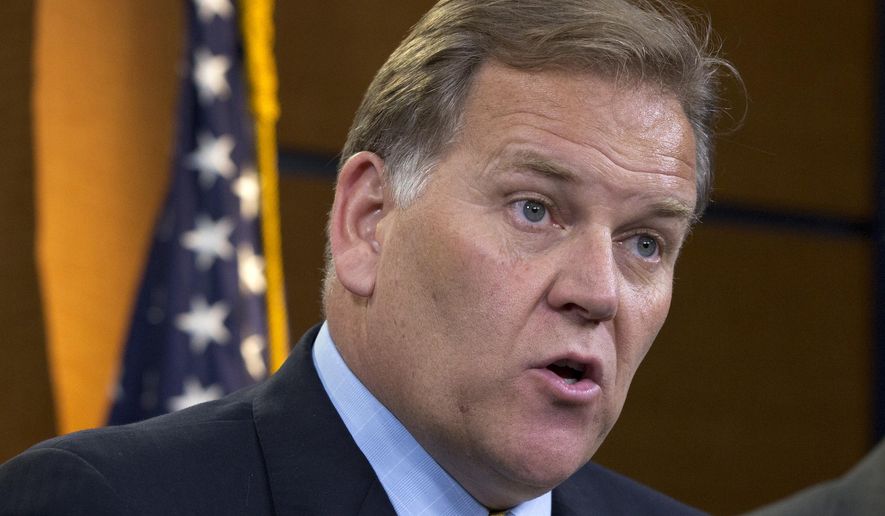The outgoing head of the House Intelligence Committee says that under President Obama, the U.S. has not done enough to combat terrorism worldwide and warned that the threat posed by Islamic extremists is as great today as it was in the months leading up to 9/11.
“The threat matrix I have never seen as bad as it is today,” said Rep. Mike Rogers, a Michigan Republican who will leave the Intelligence Committee chairmanship he has held since 2010 when he retires from Congress at the end of this year.
Mr. Rogers, who has presided over dozens of classified briefings from the CIA and other intelligence agencies over the past four years, said the rise of the Islamic State movement in Syria and Iraq is at the center of that threat matrix and can mainly be blamed on an “isolationist” approach to foreign policy embraced by the administration — as well as by a small wing of the Republican party.
Specifically, President Obama’s “conscious decisions to disengage” from Iraq in 2011 created a window for the Islamic State’s emergence and served to stiffen the resolve of other al Qaeda-inspired outfits in the region, the outgoing congressman told reporters at a breakfast hosted Friday in Washington by The Christian Science Monitor.
“I’ve been on this committee for a decade,” Mr. Rogers said. “I’ve never seen it quite so bad, because you have more streams of individuals who are associated with radical Islam — who are saying that they have either an aspiration or a capability to do attacks in the West, meaning in Europe, in the United States.”
His comments follow months of assertions by several lawmakers on both sides of the aisle over the past year that radical Islamic groups — either affiliated with Osama bin Laden’s original al Qaeda core or recently aligned with Abu Bakr al-Baghdadi’s Islamic State — control more territory around the world today than al Qaeda did during the years leading up to 9/11.
With al-Baghdadi’s Islamic State carving out a swath of territory spanning the Syria-Iraq border over the past six months, Mr. Rogers said the situation today is hauntingly comparable to the circumstances that existed more than a decade ago and that, similar to the period before 9/11, the U.S. government is presently “in the process of letting it fester.”
The longer the Islamic State is able to hold territory and recruit new members, he said, the “more likely it is they’ll have a successful attack in the United States or Europe.”
Mr. Rogers pointed particularly to the potential long-term threat posed by thousands of foreign fighters, many holding either European Union or U.S. passports, who have flocked to Syria and Iraq to join al-Baghdadi’s movement.
Several other lawmakers have attempted to draw fresh attention to the threat during recent weeks, asserting that despite a U.S.-led bombing campaign that began in September against the Islamic State, the group currently has about 15,000 foreign fighters and continues to attract more than 1,000 new ones each month.
Individuals are streaming in “from Europe, North Africa, the Gulf, the U.S. and other nations,” Rep. Eliot L. Engel, New York Democrat and the ranking member of the House Committee on Foreign Affairs, said at a hearing on Capitol Hill last week.
Administration officials say they are keenly aware of this and are working closely with allies as far away as Asia to try and stem the movement of anyone trying to join the Islamic State.
Brett McGurk, Mr. Obama’s deputy special envoy to a nearly 60 nation anti-Islamic State coalition formed since September, says coalition members are “increasingly criminalizing foreign fighter-related activities.”
“In the past month alone, foreign fighter networks have been broken up in Austria and Malaysia, and foreign fighters [were] prosecuted in Germany, Australia and the U.K.,” Mr. McGurk testified during last week’s hearing.
But Mr. Rogers appeared unconvinced during his talk with reporters Friday, saying that despite the administration’s current effort, the Islamic State continues to thrive and pose a growing threat on the world stage.
“We’re not configured today to win this fight,” Mr. Rogers said when asked by The Washington Times for his view on whether the U.S. is broadly winning or losing the global war on terrorism today. He added that much of the world sees the Islamic State and other extremist groups as “winning” and taking advantage of American disengagement.
“The longer the world sees them as winning, the more recruits they will get,” the congressman said. “That’s what we see happening, that’s the facts — more people showing up still.”
• Guy Taylor can be reached at gtaylor@washingtontimes.com.




Please read our comment policy before commenting.